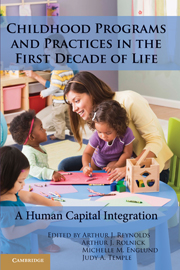Book contents
- Frontmatter
- Contents
- Contributors
- Foreword: The Essential Role of Youth Development by Robert H. Bruininks
- Acknowledgments
- 1 Early Childhood Development and Human Capital
- PART I PRENATAL AND INFANT PROGRAMS
- PART II PRESCHOOL EDUCATION
- 6 Project Head Start: Quality and Links to Child Outcomes
- 7 The Challenge of the HighScope Perry Preschool Study
- 8 Impacts and Implications of the Child-Parent Center Preschool Program
- 9 Small Miracles in Tulsa: The Effects of Universal Pre-K on Cognitive Development
- 10 Lessons From the Evaluation of the Great Start Readiness Program (GSRP): A Longitudinal Evaluation
- 11 Abbott Preschool Program Longitudinal Effects Study Year One Findings
- Commentary: Are We Promising Too Much for Preschool Education Programs?
- PART III KINDERGARTEN AND EARLY SCHOOL-AGE SERVICES AND PRACTICES
- PART IV ECONOMIC SYNTHESES OF EARLY CHILDHOOD INVESTMENTS
- Appendix Question-and-Answer Sessions
- Name Index
- Subject Index
- References
Commentary: Are We Promising Too Much for Preschool Education Programs?
Published online by Cambridge University Press: 05 June 2012
- Frontmatter
- Contents
- Contributors
- Foreword: The Essential Role of Youth Development by Robert H. Bruininks
- Acknowledgments
- 1 Early Childhood Development and Human Capital
- PART I PRENATAL AND INFANT PROGRAMS
- PART II PRESCHOOL EDUCATION
- 6 Project Head Start: Quality and Links to Child Outcomes
- 7 The Challenge of the HighScope Perry Preschool Study
- 8 Impacts and Implications of the Child-Parent Center Preschool Program
- 9 Small Miracles in Tulsa: The Effects of Universal Pre-K on Cognitive Development
- 10 Lessons From the Evaluation of the Great Start Readiness Program (GSRP): A Longitudinal Evaluation
- 11 Abbott Preschool Program Longitudinal Effects Study Year One Findings
- Commentary: Are We Promising Too Much for Preschool Education Programs?
- PART III KINDERGARTEN AND EARLY SCHOOL-AGE SERVICES AND PRACTICES
- PART IV ECONOMIC SYNTHESES OF EARLY CHILDHOOD INVESTMENTS
- Appendix Question-and-Answer Sessions
- Name Index
- Subject Index
- References
Summary
I have been closely involved with our nation's Head Start program since the 1960s. I was on the project's planning committee, served for 2 years as the federal official responsible for administering it, and have since advised every presidential administration – both Democrat and Republican – on Head Start issues. I have been witness to the advances and retreats, the positives and negatives, in how early intervention has been perceived by decision makers, scientists, and the public over the years. Certain facts in the history of early intervention have been lost in the mist of time, and you know what they say about those who do not know history being destined to repeat it. The primary purpose of this brief paper is to remind readers of these facts so they can recognize the patterns before they again bedevil our efforts on behalf of young children.
Shortly after the birth of Head Start, both Bettye Caldwell and I feared that the program was being oversold and could not possibly fulfill the expectations that policy makers such as President Johnson and his War on Poverty czar, Sargent Shriver, had raised. The president confidently promised Americans that Head Start would soon put an end to poverty and enable the preschool graduates to avoid welfare dependency, crime, and imprisonment when they grew up.
- Type
- Chapter
- Information
- Childhood Programs and Practices in the First Decade of LifeA Human Capital Integration, pp. 235 - 240Publisher: Cambridge University PressPrint publication year: 2010



